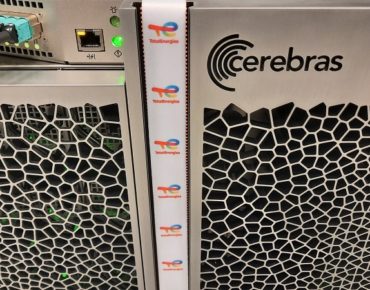Cerebras Systems Supplies 2nd-Gen AI System to TotalEnergies

Cerebras Systems, pioneer of wafer-scale computing for AI and HPC, today announced that TotalEnergies (formerly “Total”) has deployed the Cerebras CS-2 system at its Houston facilities to accelerate its multi-energy research. The news marks the first publicly disclosed customer win for Cerebras in the energy sector.
“This is a new segment for us,” Andrew Feldman, CEO and co-founder of Cerebras Systems, told HPCwire. “To remind you how big the segment is, its share of GDP is about 8 percent, whereas all of advertising – including Google, Meta, etc. – is 2 percent.”
When evaluating the CS-2, TotalEnergies’ engineers chose as a benchmark application a piece of their seismic modeling code called “seismic wave propagation modelling using stencil based finite difference algorithms.” The workload involves a combination of AI and geological simulations.
The team wrote custom kernels that allowed them to optimize their proprietary codes for the CS-2. In the benchmarking tests, the Cerebras machine demonstrated a 100x performance gain in comparison to a “a modern GPU” based system, according to the companies.
Feldman attributes this to the CS-2’s higher memory bandwidth and the use Cerebras’ software development kit, which was announced in November.
“Total and Cerebras engineers wrote the benchmark code using the new Cerebras Software Language (CSL), which is part of the Cerebras Software Development Kit,” noted a Cerebras blog post, published earlier today. “Developers can use the Cerebras SDK to create custom kernels for their standalone applications or modify the kernel libraries provided for their unique use cases. The SDK enables developers to harness the power of wafer-scale computing with the tools and software used by the Cerebras development team.”
TotalEnergies took delivery of the CS-2 last month. Engineers are using the system to accelerate a wide range of AI and simulation work used in the development of batteries, biofuels, wind flow, drilling, and CO2 storage.
“Cerebras Systems offers one of the highest performance AI accelerators,” said Dr. Vincent Saubestre, CEO and president, TotalEnergies Research & Technology USA, in a statement. “We count on the CS-2 system to boost our multi-energy research and give our research ‘athletes’ that extra competitive advantage.”
TotalEnergies is no stranger to HPC. The company’s Pangea III supercomputer, a GPU-accelerated IBM Power9 system, currently ranks 29th on the Top500 list with 7.8 Linpack petaflops. In 2016, the energy giant operated the largest publicly announced industrial supercomputer, an SGI-built system called Pangea. With 5.3 petaflops Linpack performance, Pangea now ranks 93rd on the Top500.
TotalEnergies is the third public customer win for Cerebras’ second-generation wafer-scale machine, the CS-2, which is also installed at Argonne National Lab and GlaxoSmithKline. Argonne’s CS-2 system contributed to a multi-agency Covid-19 reproduction study that was nominated as a Gordon Bell Special Prize finalist.
Other Cerebras customers include Lawrence Livermore National Laboratory, Pittsburgh Supercomputing Center, the University of Edinburgh and Tokyo Electron Devices.
Launched earlier this year, the CS-2 is based on Cerebras’ second-generation Wafer-Scale Engine (WSE-2) chip, made by TSMC on its 7nm node, featuring 2.6 trillion transistors and 850,000 cores. The WSE-2 has 40GB of on-chip SRAM memory, along with 20 petabytes of memory bandwidth and 220 petabits of aggregate fabric bandwidth.










